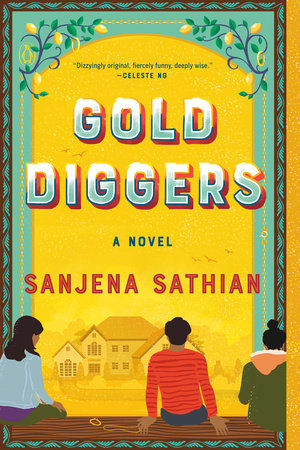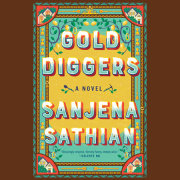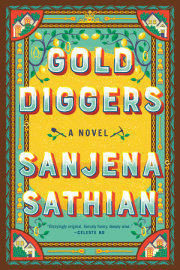Chapter 1.
When I was younger, I consisted of little but my parents' ambitions for who I was to become. But by the end of ninth grade, all I wanted for myself was a date to the Spring Fling dance. A hot one. The dream was granted, by chance. Finding myself unaccompanied in the final days before the event, I begged my neighbor and childhood best friend, Anita Dayal, to take pity on me. Fine; I could be her "escort," she allowed, putting the word in air quotes as we readied for that rather fateful night.
Before the dance, I was set to meet Anita and our crowd at the mall. We'd take photos outside the TCBY, all trussed up in our Macy's finery. My mother deposited me on a median in the middle of the parking lot, early, then sped off to my older sister's picture party. Prachi had been nominated for Spring Fling court and was living a more documentable high school life. Prachi, the Narayan child who managed to be attractive and intelligent and deferential to our cultural traditions to boot, was headed to Duke, we were all sure. Earlier that day, cheeks blooming with pride, my mother had fastened a favorite, slim gold chain of her own, gifted by our nani, around Prachi's neck. My sister kissed my mother's cheek like an old, elegant woman and thanked her, while I waited to be dropped into my own small life, in an ill-fitting suit.
I waited on the median, growing anxious. There was no sign of Anita. I paced and fidgeted, watching the others pin corsages and boutonnieres, and readied myself, after fifteen minutes, then twenty, to give up and trek down one of those horrible sidewalk-less stretches of great Georgia boulevard back home to Hammond Creek. I was already turning away from the fuss, attempting to loosen my father's congealed-blood-colored tie, when Anita and her mother screeched up in their little brown Toyota. I knocked my knee against the concrete dolphin-adorned fountain and shouted, "Shit!"
A wall of mostly Indian and Asian parents regarded me with a collective glare. Yes, I consisted largely of my parents' ambitions, but some part of me was also made of the ogling, boggling eyeballs of the rest of our community.
And another part-a significant part-was Anita, who was now stepping out of the double-parked car, smiling blithely. Anita had bright eyes: muddy brown, lively, roving, liable to flick over you quickly, as though there was something else more interesting or urgent in your vicinity. It made you want to stand squarely in her line of vision to ask for her full attention; when you got it, it felt like the warming of the late-morning summer sun.
"Neil, I told her we were late, but stubborn girl wouldn't listen!" Anita's mother, Anjali Auntie, said. She was dressed like she planned to attend the dance herself, in a bright green sheath framing her breasts, a dress that reminded me she was unlike other mothers.
"I got invited to Melanie's picture party first," Anita said. "I IM'd you!"
A betrayal: cherry-cheeked and universally admired Melanie Cho had laughed off my invitation to the dance weeks before, leaving me itchy with self-loathing. Anita's grin-the grin of the newly anointed popular-matched the crystal studding along her bright blue bodice.
Anjali Auntie positioned us shoulder-to-shoulder. Anita linked her arm through mine so the insides of our elbows kissed. This was how we'd been posed in Diwali photos as kids, when our families got together and Prachi dressed Anita up as Sita and assembled a paper crown for me, her spouse, Lord Rama. The posture suddenly seemed foreign.
There was no time to be angry. I smiled. In the photos, I am washed out. She, in electric blue and crystal, beams, her eyes settled somewhere just above the camera lens.
The dance: People were learning to inch closer to each other, and some girls didn't mind the short guys' heads bobbing below theirs, and some guys didn't mind the girls with braces. The teachers on chaperone duty patrolled the bathrooms, where kids who were not my crowd might engage in "nonsense," as my mother put it, nonsense that was inaccessible to me at the time.
As with any other event at Okefenokee High School, the room was semi-segregated. A handful of white kids mosh-pitted in the middle of the party; others made their way to those nonsense-filled bathrooms or the parking lot. The good-looking Indian and Asian girls hung by the long banquet table. The debate, math Olympiad, robotics, etc., Indians and Asians were the likeliest ones to be bopping around, because though none of us could really move, the dancing offered a prescribed activity for the evening, a script. I depended on scripts in those days, before anyone asked me to invent my own life.
I followed Anita onto the floor, expecting to join the circle dancing around Hari Chopra, who was attempting to prove his B-boy abilities to the Kanye song that was ubiquitous that year, flicking a finger across an imaginary flat-brimmed hat in the warm-up. But Anita veered toward a cluster of girls that included my sister and Melanie. I stopped at the edge of the squeaky gym floor in my dress shoes, which were vast, boatlike, slippery, and made me sweat.
"Anita," I whispered frantically, but she mouthed, Just a second, and darted into the girl cluster-as though she was crossing the finish line in a race I hadn't known she was running. She'd grown spritely and uncatchable lately, always squinting at a secretly looming horizon line.
I didn't see my date again until the end of the evening, let alone dance with her. The ghost of her touch on me-the inside of her elbow against the inside of mine-lingered on my skin. I felt insubstantial.
I spent the party with Kartik Jain and Manu Padmanaban and Aleem Khan and Jack Kim and Abel Mengesha (who was Ethiopian but clocked most of his time with the Asians), avoiding Shruti Patel, with whom Manu had agreed to come, and whose electrified bristly hair and eager gopher teeth discomfited us. Jack was counting the girls he'd made out with at computer camp the year before, in an effort to overcome the fact that he was here tonight alone. I had been at that camp and knew the single kiss he'd received was dumb luck, the result of a double dog dare.
I was supposed to return home with Anita and her mother at ten-their house sat catty-corner from ours in the Hammond Creek cul-de-sac. Ten; I only had to last till ten. I watched the egg-shaped clock on the wall above the banquet table tick. I drank the sugary punch; it stained my tongue Coke-can red.
Just before nine thirty, people began to gather for the announcement of Spring Fling royalty. At the swell of a tantalizingly sex-infused slow song-Crash into me, and I come into you-I went looking for Anita. I wound through the gym, all elbows and too-long hair that curtained the top of my vision. No Anita. No Prachi. I sidestepped out of the gym and down the hallway carpeted in green and gray-the swampy colors of Okefenokee High School. It occurred to me that I might find the girls in the parking lot. The parking lot, full of nonsense.
I pushed open the first door I encountered, missing, in my annoyance, the sign that read EMERGENCY EXIT. The alarm wailed. People's hands flew to their ears, and heads turned toward me. A white guy gripped a handle of some clear verboten substance. Someone cursed. Someone shrieked. Someone laughed. I stood mute as they scattered. When Coach Jameson came striding outside to bust up the party, he noted my presence, held up a large, meaty finger, and said, "Wait there." I froze, darkened by the shadows behind the gym.
Girls were crying. Not Anita, I don't think. It took a lot to make her cry. From somewhere came my sister's voice, in the buttery lilt that never failed her: "Coach, I just came out here to find my necklace, it fell off, it's my grandmother's, you know I don't drink-"
"I'll ask, missy," he said. "What were you doing to cause you to, ahem, lose a necklace?"
I shuddered and didn't catch Prachi's reply because Anita stood behind me, propping open the door whose alarm had at last been killed.
"Neil, get inside, you'll get in trouble," she whispered. Her glossed lips quivered and for a moment I was suffused with a premonition that something phantom wished to be spoken aloud but that no one-not me, not the people around me-could find the language. Anita clamped her mouth shut and blinked very fast, as though beating back that ghost, and there we remained, still rooted to our finite asphalt selves.
I said Prachi was out there and it didn't sound good. "The coach already saw me," I added. "I'm not supposed to move."
"Are you kidding me, Neil?" Anita was framed in the doorway as the hallway light streamed out around her. "My mom's waiting, like, right now."
"I wasn't drinking."
"I know you weren't drinking," she said. No, more like-"I know you weren't drinking." I wondered how she had come by all her new wisdom, how she had grown so fast, so far ahead of me. "Did you set off the alarm?"
I nodded miserably.
"Dude," Anita said. "People go out the food delivery door." She pointed. She spoke rapidly, percussively, with a bravado that might have masked her nerves at being so near trouble.
"C'mon, kid." Coach Jameson led his small troupe of prisoners inside, beckoning me with that meaty finger, holding the alcohol pinched in his other hand like a used rag. The captured students followed, heads bowed-two white guys I didn't know, Katie Zhang, Mark Ha, Prachi. My sister mouthed, What? at me while Coach Jameson looked Anita up and down and added, "And you, rubbernecker."
"I just got here, coach," Anita said. Her voice caught in her throat before she switched to a clipped tone like the sort my mother used on work calls. I could feel her straining to be someone with whom she had not yet become fully acquainted. "Actually, we were trying to leave. My mom's outside, you can ask her-"
"Y'all well know not to be in the parking lot."
"I just got worried, see," she tried again, in a slightly sharper pitch. "Because-"
"What's your name?"
"Anita Dayal."
"And yours?"
"Neil Narayan."
He repeated. "Anita Dial. Neil Nay-rannan. Y'all're freshmen?"
"Yes, sir," Anita said.
"Stay away from this crowd," Coach Jameson said grandly. "Getcherselves home."
He escorted his captured cool kids past us. The scent of our innocence-or mine, anyway-was strong enough to overpower everything else.
Some kids my age drank alcohol, but I was afraid to, not because of the things the health class teacher cautioned would happen to your body and brain but because of my mother's warnings that engaging in nonsense could abort all you were supposed to become, could in fact abort the very American dream we were duty-bound to live out. Take the case of Ravi Reddy, whose parents had shipped him to Hyderabad to finish high school upon smelling beer on his breath. No one had heard from Ravi since, but my mother had hinted that she and my father were not above taking a leaf out of the Reddys' book.
I would not have wished such a fate on anyone, let alone my sister, so I said to Anita, "Can you get your mom to wait two minutes? My sister lost our grandmother's gold necklace, and she'll be even more screwed."
Anita bit her lip. Something shifted in her posture, brought her into a new alertness, like when she was asked a question to which she knew the answer in algebra.
"Oh." She retrieved her pink flip phone from her fake-pearl-encrusted purse. "Mama. Coming. But Prachi lost this gold necklace, and Neil-" A pause. She hung up. "My mom says be quick."
"My sister doesn't drink." I held up a flashlight that connected to my Swiss Army knife and house keys. Nothing showed itself on the asphalt, just the black Georgia ground beneath the black Georgia sky. Puddles of yellow lamppost light revealed the riddled texture of the parking lot. There were no secrets here; in this stupid place, what you saw was what you got.
"All of them drink," Anita said, peeling away. "You can't run in that crowd and not drink." Did Anita drink? A pang in my chest-for wasn't she now in that crowd? "She ditched with Hudson Long because she knew she was going to lose Spring Fling Princess."
"She lost?" I sighed. Even if Prachi escaped Coach Jameson, she'd be smarting from defeat. I didn't fancy enduring one of her performances of grief, wherein she refused to make eye contact with us for days, or ensured I overheard her vomiting in the bathroom. "See anything?"
"Nah," Anita called, a little nasally.
I cast my light beneath the dumpster, knelt and got a smashing stench of cafeteria chili and old bananas and a number of other smells both animal and human. I covered my nose, stood, ran the beam in a long line like a searchlight hunting a fugitive in desolate farmland, sweep, one, sweep, two, but nothing on the asphalt glinted like gold. "Nothing?" I called.
"Nothing." Anita was kneeling by the wretched emergency exit door and reaching for something on the ground.
"Is that it?" I half jogged over.
"Nope," she said. "It's not here."
I was right next to her now. "You didn't find it?"
"I just said I didn't. My mom's gonna be mad; we have to go."
"Your mom's never mad." I waved my hand dismissively. Anjali Auntie was different-a given-and Anita could not believably invoke her as a threat. "What's in your hand, Anita?"
For her fist was clenched, her knuckles bloodless. She looked ready to slug me.
Her jaw tightened. Then she growled through her teeth, as though she'd been trying to tell me something and I'd been too dense to hear it. "Neil, you are such a freak! Prachi lost her necklace because she's drunk and making out with Hudson Long, and I've got enough to worry about without helping you fix her shit."
She opened the door and stomped over the green-and-gray carpeting. I followed. I couldn't do anything but slide into the back of the Toyota. Anita and her mother sat in wooden silence up front. Anjali Auntie's eyes landed searchingly on mine in the rearview mirror a few times before settling sidelong on her daughter's taut expression. Her own face remained impassive; I could not tell if she was surprised at the coldness between Anita and me.
Back home, in my room, I wrenched myself free from my father's tie and tried to fall asleep as the landline rang and heels sounded below me - Prachi coming home, Prachi in trouble, my parents' voices rising. ("Who were you with? "Open your mouth, show yourb breath!" "Where's Ajji's - ?" "Ayyayyo!" "You'll jolly well tell us -!") Prachi, the golden child, fallen from grace, some essential blessing lifted from her.
Copyright © 2021 by Sanjena Sathian. All rights reserved. No part of this excerpt may be reproduced or reprinted without permission in writing from the publisher.










